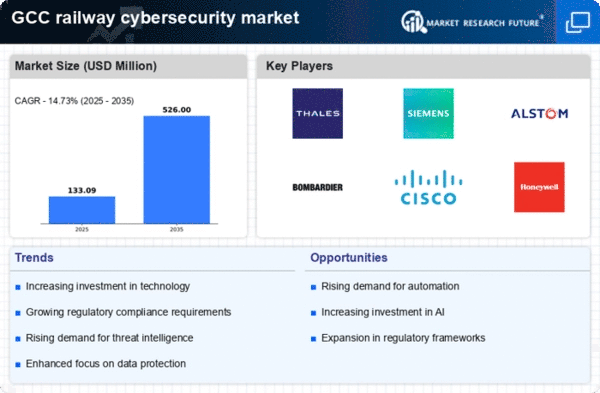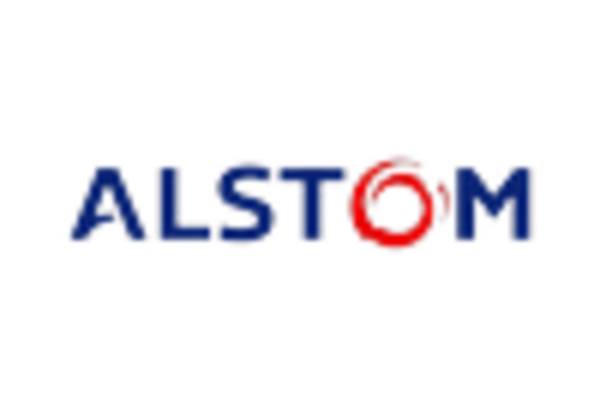Growing Threat Landscape
The railway cybersecurity market is experiencing heightened demand due to an increasingly complex threat landscape. Cyberattacks targeting critical infrastructure have surged, with reports indicating a rise in incidents by over 30% in the last year alone. This alarming trend compels railway operators in the GCC to invest in robust cybersecurity measures to safeguard their systems. The potential for significant financial losses, estimated at millions of dollars per incident, further underscores the urgency for enhanced security protocols. As cyber threats evolve, the railway cybersecurity market must adapt, leading to innovations in technology and strategy to protect against sophisticated attacks. The need for comprehensive risk assessments and proactive measures is paramount, driving growth in the market as stakeholders seek to mitigate vulnerabilities and ensure operational continuity.
Technological Advancements
Rapid technological advancements are reshaping the railway cybersecurity market, particularly in the GCC region. The integration of Internet of Things (IoT) devices and smart technologies in railway systems has introduced new vulnerabilities, necessitating advanced cybersecurity solutions. The market is projected to grow at a CAGR of 12% over the next five years, driven by the demand for innovative security technologies. Solutions such as artificial intelligence and machine learning are becoming increasingly prevalent, enabling real-time threat detection and response. As railway operators seek to modernize their infrastructure, the need for sophisticated cybersecurity measures becomes critical. This trend not only enhances the resilience of railway systems but also fosters trust among passengers and stakeholders, ultimately contributing to the growth of the railway cybersecurity market.
Increased Regulatory Scrutiny
The railway cybersecurity market is significantly influenced by increased regulatory scrutiny in the GCC. Governments are implementing stringent regulations to ensure the safety and security of critical infrastructure, including railways. Compliance with these regulations is becoming a priority for railway operators, as non-compliance can result in hefty fines and reputational damage. The market is witnessing a shift towards adopting standardized cybersecurity frameworks, which are essential for meeting regulatory requirements. This trend is expected to drive investments in cybersecurity solutions, as operators strive to align with national and international standards. The emphasis on regulatory compliance not only enhances the security posture of railway systems but also stimulates growth in the railway cybersecurity market, as stakeholders seek to navigate the evolving landscape of regulations.
Investment in Smart Infrastructure
The shift towards smart infrastructure is a key driver of the railway cybersecurity market in the GCC. As governments and private entities invest in modernizing railway systems, the integration of smart technologies presents both opportunities and challenges. While these advancements enhance operational efficiency, they also introduce new cybersecurity risks. The railway cybersecurity market is projected to benefit from this trend, with investments expected to reach $1 billion by 2027. Stakeholders are increasingly recognizing the importance of embedding cybersecurity measures into the design and implementation of smart systems. This proactive approach not only mitigates risks but also ensures the long-term sustainability of railway operations. As the demand for smart infrastructure continues to grow, the railway cybersecurity market is likely to expand, driven by the need for comprehensive security solutions.
Public Awareness and Demand for Safety
Public awareness regarding cybersecurity threats is rising, significantly impacting the railway cybersecurity market. As incidents of cyberattacks gain media attention, passengers are increasingly concerned about the safety of their travel experiences. This heightened awareness is prompting railway operators in the GCC to prioritize cybersecurity investments to reassure customers. Surveys indicate that over 70% of passengers consider cybersecurity measures when choosing a railway service, highlighting the market's responsiveness to consumer demand for safety. Consequently, railway operators are compelled to enhance their cybersecurity frameworks, leading to increased spending on advanced technologies and training. This trend not only addresses public concerns but also fosters a culture of safety within the railway industry, ultimately driving growth in the railway cybersecurity market.

















